#a refugee is a refugee. treat them all equally
Note
Could you say a bit more about your thoughts on zygon inversion?
the whole two-parter is about how refugees (the zygons) who are being settled by the british government, and how some of them are Good Refugees who just want to assimilate and be Normal Human (read: British) People and some of them are Bad Refugees who join a scary terrorist group that use this fucking banner:

it is, i think, completely impossible for anyone with even the slightest understanding of european political discourse to not immediately scan this as being, if not a 1-1 to metaphor exactly, about as damn close to being About Muslim Immigration as it gets, playing on the everpresent fear of the european white supremacist right that asylum seekers and refugees from west asia are all secretly suicide-bombers in waiting. and this episode takes the liberal stance on this, which is that yes, obviously some of them are insane violent evil militants who just want to kill people, but some of them are The Good Ones, and we should figure out a way to find and punish The Bad Ones without impactiung the Good Ones Too--this is, broadly, the liberal stance on immigration in the UK, and it is obviously also prima facie accepting of islamophobic ideas! jack graham did a great piece on it.
the doctor's little speech at the end of the zygon inversion essentially boils down to 'war is bad, you just want war because you're an arrogant idiot who won't be affected by it'. which would be all very well and good in an episode like the frontier in space, where the confrontation is between two competing imperialist powers full of bluster and bravado and jingoism--but in talking to UNIT and the zygons, he's textually equivocating between refugees who are unhappy with their mistreatment at the hands of the British government and the British government agency mistreating them (yes, i know UNIT is nominally plurinational but that is not the portrayal of them we are getting here.) the fundamental problem with the scene is that bonnie (as elizabeth sandifer has pointed out) is only there to say vacuous nonsense that basically amounts to "i love war and violecen and i think its good" so that the doctor can heroically say, "actually, itsNot good." she's written as such an embarrasing caricature for the doctor to knock over that it imo makes the whole speech profoundly unearned.
of course, peter capaldi sells it, like he often sells garbage he's given to say! it's even a moving speech against war, when taken out of context--but taken in context, it's just equivocating between the oppressed and their oppressors and treating them both as equally responsible for making peace, and i think that's morally repulsive.
147 notes
·
View notes
Text
Do not stop talking about Palestine. Do not forget about Palestine. This is not a battle of religion and I do not think it should be treated as such. From the river to the sea, they will be free 🇵🇸
Disclaimer: I am not an expert. I am just some guy in the US. I am not a direct source of information. Please listen to Palestinians. Please help them directly. Please help with protests if your country is supplying Israel with weapons like the US.
#but wait there's more#it may take a while for me to gather my thoughts so not immediately#I have so many thoughts specially about holy land experience type shit#my personal belief is that Palestinians should be given back their land#Israel will become a part of Palestine and would receive full citizenship#and all of them will be treated as equals#Aid will go to Palestinians as the country and rebuilt as much as it can be after so much tragedy#Since the idea of Israel was to have a protective Jewish state#I think the better option would be for the world to agree collectively to be a place for refugees#if there's another situation like the holocaust#all refugees should be given that opportunity to escape#there's so many conspiracies against Jewish people which is why I think it needs to be declared by countries to protect any Jewish person#that is fleeing antisemitism in their current country#it doesn't need to be a Jewish state especially with so many Jewish people being pro-Palestine#and living outside of Israel#I know people currently living in Israel and I want them to be safe#And they will be if their government just lets Palestinians live#but yea later on I'll talk about the holy land experience thing I'm pissed about rn#I feel like I haven't said enough on the blog. I have terrible OCD where I'll ruminate about this until I panic#I do not want to be a source of that for others so I encourage you to educate yourself without ruminating#It does not help Palestine to shame yourself and others for not being able to do a specific thing#So instead I ask you to look it up when you are able to and do what you can#I usually do the daily clicker and I wanted to join my university's protests but couldn't#since I was the only one working my job which is monitoring the queer safe space on campus#and I didn't want to close that area just in case it was need by protesters or queer students#just found out today ppl at my school will be expelled if caught so that's why it's at the front of my mind rn
3 notes
·
View notes
Text
Do you ever think about how Halsin's entire arc was always leading up to him adopting all those children?
One of the first things we learn about Halsin is that he took in the Tiefling refugees- many of whom were children.
The first thing he does when he returns to the Grove is scold Kagha for trying to cast them out, and for holding the Idol of Silvanus on equal weight to a child's life- and if Arabella dies, he is so livid he tells Kagha she should have died to her face, speaking with such anguish at what happened.
Then we learn that his first friend was a timeless child nature spirit, who Halsin feels protective and paternal of, and this extends to the Shadow-Cursed version of him. He speaks to Oliver with kindness and gentleness, never patronizing, but always full of empathy.
When you get to know Halsin as Wyll, you can say you've always wanted a child, and Halsin will agree and all but say he wants one too.
Then he gets to act 3 and spends the entire act furious at how those in the city, especially children, are treated. He wants Yenna in their camp not only to keep her safe, but because "our little abode could use a child's laughter." He gets distraught over the plight of many children in the city, and if Yenna is killed by Orin, he's crushed- but also vows to fight so there will be no more Yennas. In fact, he is so upset about this that he is the only character the player has a special dialogue for to check in on him after Yenna dies. This option doesn't exist for, say, Karlach, Jaheira, and Wyll, despite them being kind characters with a soft spot for children too. Halsin's care goes even deeper than theirs.
He also sadly says how unlike Jaheira, his Archdruidic duties prevented him from being able to have a child of his own.
Literally Halsin's entire arc foreshadowed that he wanted to be a father more than anything, and that he wanted to help the defenseless- nature itself, animals, refugees, children. He got to do all of that at once with the commune and all the children there.
When talking to a romanced player after the final battle but before the epilogue, which is implied to be the very next day- but if not, certainly not more than a few days after- he says the children call him Daddy Halsin. It took less than a week for him to meet a group of terrified, traumatized children and gain their trust and affection so thoroughly that they already considered him a parental figure.
It just says so much about exactly what kind of person Halsin is.
2K notes
·
View notes
Text
A few days ago, in my quest to fight the antisemitism that lifted its head around the world following the massacre of October 7th, I stumbled upon a clip from a UN assembly where the speaker asked a simple question-
Dear Arab world, where are your Jews?
A lot of people think that Israeli roots come from Europe exclusively. But in fact, Jewish people were hunted in all corners of this world. In Europe, of course, but also in Asia, Africa and other places all over the planet.
My grandma is an Iraqi Jew. Iraqi Jewish community is one of the oldest Jewish communities in the world, being the direct descendants of the Babylonian exile Jews, so ancient it is an exile mentioned in the Bible.
Recent studies, in which DNA retrieved from canaanite burial lands was compared to current populations in the area of ancient Canaan, has found that Iraqi Jews share the highest similarity to canaanite DNA out of all Jewish communities, more than 50% of the DNA on average.
All the beautiful, peaceful Jewish communities of the Arab world were wiped out in the blink of an eye.
The Arabic world has never treated their Jewish communities as equal citizens, oftentimes robbing them of any rights and performing violent acts of genocide against them (check 'Farhud' on Google).
But their voice was silenced once they fled to Israel.
So I decided to recap my grandma's story in the comments of the clip:
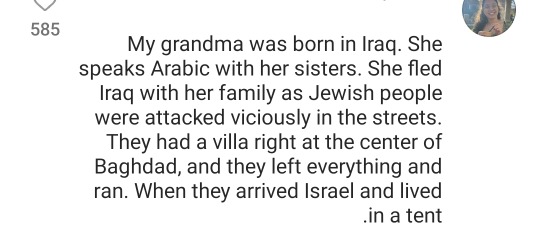
Soon after, many Jewish people with Arabic, or 'Mizrahi' heritage, shared their stories as well:

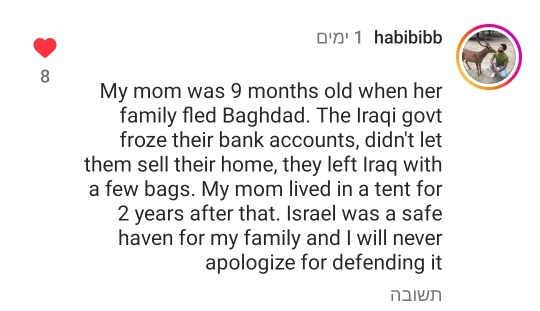
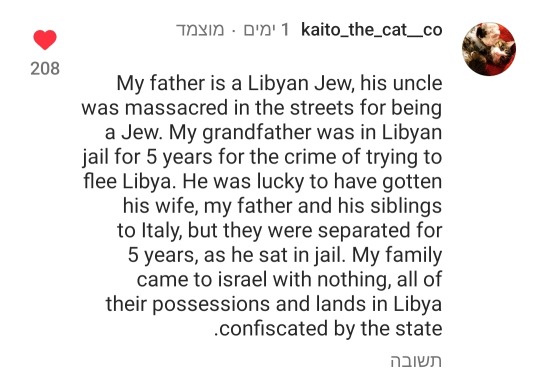
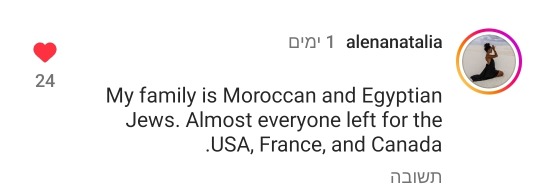
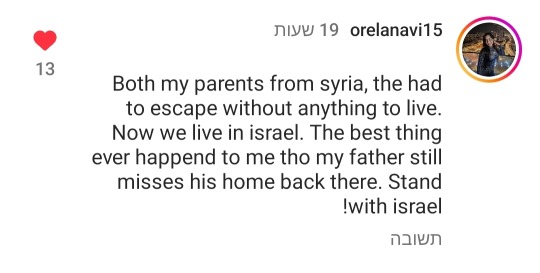

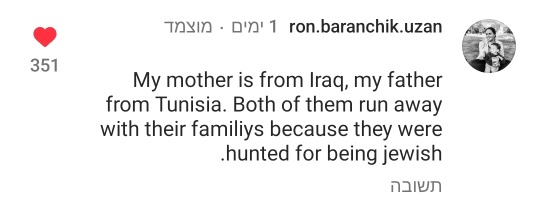
Jewish people all over the planet were driven out of their homes, ethnically cleansed by their neighbors, rulers, and governments.
We are still not welcome in most of the countries of the Arab world. Unable to see glimpses of our history.
My grandma still wishes she could see the house she grew up in. Holding the memories, but unable to set foot in that land, because she would be executed.
Nevertheless, she's not a refugee. She might've fled to Israel, but in Israel, her family got equal rights as citizens, and she built a house on a land she now calls her home.
Don't erase my grandma's story. Don't erase the Jewish ethnic cleansing that brought her to seek a safe haven in Israel.
Israel is a home for more than half of the Jewish people on this planet. Out of the ~8,000,000 Jews who live in Israel, there are about ~2,500,000 Jews of Mizrahi heritage.
And as Golda Meir once said: "our secret weapon is that we have nowhere else to go."
#omi talks#jewish#Iraqi Jews#jumblr#israel#mizrahi jews#canaan#I hate the fact that Israel only trends on this hellsite when people wish its destruction#it's never two state solution it's always 'from the river to the sea'#that's just messed up
1K notes
·
View notes
Text
The only thing I’m actually an apologist for in DA is the Qunari
#OBVIOUSLY not all of it. they go way too far in ‘the good of the many outweighs the needs of the few or one’ mentality & are too strict#and the no families sucks and the way they treat Mages might be the worst thing about them & the attempts to convert forcibly real bad#but the culture itself?? REALLY cool! it’s not that they’re like. amazing or not deeply. deeply flawed. but they’re actually very cool and I#deeply enjoy and respect much of their ways of doing things. DA2 Arishok one of my favorite characters. the man put up with abuse after#abuse for four years just trying to do his honorable duty to his people & finally lost it not because of being trapped or his people being#killed and tortured. but because he couldn’t stand the way Kirkwall mistreated it’s own anymore after 4 years of the racism & income#inequality and horrid politics and dying refugees. they’re /so/ big on equality and justice. extremely progressive just in a fucking bizarre#way (jobs are the gender. no gender roles you just are whatever gender your job is. want to fight? okay have fun sir. want to lead? yes#ma’am. priest? ok do whatever same for you basic jobs have fun. it doesn’t matter literally at all what you are so long as you joined the#ethno-religion. super pro trans. bizarre aromanormative society that has the sweetest friendship cultural practices I’ve ever seen. I don’t#understand it all but I’m very very here for it)#they’re really not more flawed than Tevinter or the European countries. they just have flaws that Europeans are more used to demonizing and#fearing instead of accepting and living with
1 note
·
View note
Text
Currently rereading Eric Flint's 1632 and reflecting on just how influential Flint was to me and my approach to both praxis and politics as a teenager. I found Flint when I was about thirteen or fourteen, around the time I found Pratchett I think, and he's left an equally wide thumbprint on my soul. Isn't that the most wonderful thing about stories, that people you've never met can help shape our adult selves? Mother of Demons I often recommend for its SFF worldbuilding--Flint built a species with at least four genders, only some of which are reproductive, and associated "normal" sexual orientations, and then proceeded to write in a textually intersex character and queer the hell out of it.
1632, though, is the one where a little West Virginia town in 2000 gets picked up and dropped in the middle of Thuringia, Germany in the eponymous year--right in the middle of the Thirty Years War. The local United Mine Workers of America chapter plays a major role, particularly its head.
As I write this I'm listening to the scene where the little town of Grantville, having admitted after a few days that they are probably not ever going home, is crowded into the high school gymnasium listening to the mayor lay that reality out and suggesting an interim council to help the town set out a sort of constitutional convention so they can work out what on earth they're going to do moving forward--especially since there's a bunch of displaced refugees collecting in the forests nearby. Sensible of them, really; the Americans murdered the shit out of the local soldiers that displaced them, on account of how the shaken mine workers that went out to figure out WTF happened not being super down with suddenly running into a bunch of fuckheads raping the locals and torturing people to find out where their valuables might be. After that, said Americans proceeded to retreat into the town boundaries and gibber quietly to themselves. I would go lurk in their woods, too.
Anyway, the mayor sets up this proposal, everyone agrees, and a CEO who was visiting for his son's wedding at the time steps forward and says: look. I know how to lead, and I'm probably the most qualified person here. I lead a major industry corporation effectively and I did that after my time as a Navy officer. I put myself forward because I'm qualified. Now, we're going to need to circle the wagons to get through the winter, tighten our belts, but we can get through this. We can't support all these refugees, though; we'll have to seal the border so they can't bring disease--they're a drain on our resources we can't afford--
and the UMWA guy, he gets really mad listening to this. There's this Sephardic refugee woman he's real taken with who got swept up in the town first thing, and she's sitting in and listening; he's thinking about throwing her out, thinking about how much she knows about the place they're found in, and he's furious. But he gets a good grip on his anger and he marches up and he says, look. This dude has been here two days and he's already talking about downsizing?! You're going to listen to this CEO talking about cuts, cuts, cuts? Nah. Trying to circle the wagons is probably impossible, it's stupid, and if you think my men and I are going to enforce that, you can fuck off. That proposal is inside out and bass ackwards. We've got about a six mile diameter of Grantville here; how much food do YOU think we're going to grow? How about the soldiers wandering around, do you think we're going to be able to fight armies off on our lonesome? Look at the few refugees we already have in the room, they'll tell you how those armies will treat you! We could do it for a while, the amount of gun nuts here, but so what? We don't have enough people to shoot them! Not if we're going to do anything else to keep us going! We have about six months of stockpiled coal to keep going, and without another source or getting the coal mines working, we're screwed. We have technical strength but we don't have the supplies or resources we would need to maintain it. Those refugees? They're resources. We need people to do the work we will need to keep ourselves. The hell with downsizing; let's grow outwards! Bring people in, give them safety, see what they can bring to the table once they've had a moment! He invokes: send us your tired, your poor!, and the CEO yells in frustration: this isn't America! so he yells back "it will be!"
And of course everyone cheers. I love Flint for many reasons but he is unapologetic about affection for the America of ideals--ideals, he freely admits, that are often honored in the breach rather than the observance, ideals that are messy and flawed, but nevertheless ideals that can work to inspire us to become the best version of ourselves. For Flint, history is as valuable as a source of stories to inspire ourselves as it is a repository of knowledge, and on this I tend to agree with him. We must learn from our moments of shame but equally we must learn from moments that show us how to be our best selves.
It's been twenty three years and the text is now an interesting historical document in its own right, hitting points and rhythms in beats that are sometimes out of place today. It's not perfect. But the novel contains a commitment to joy and to emphasizing the leaps of faith and understanding that regular, everyday people make every day to try and support each other that I routinely try to match in my writing.
Anyway, one of the strengths of the novel, I think, is its gender politics: it's a very ensemble kind of novel, lots of characters, and it's preoccupied with positive masculinity in a lot of ways. There's a lot of these hyper masculine characters--Mike Stearns perhaps more than anyone else--and--and...
... And Flint's characterization of Stearns, as he sketches out who the man is--his pivotal American leader, ex boxer, working class organizer, big man.... well, it lands equally on "he is delighted and astonished to find a local woman who quickly assesses how the cushion of air in tires works," and "he considers who to set up a Jewish refugee in the middle of Germany up with and he thinks to ask the Jewish family he grew up with to host her and her ill father because he thinks she'll be most comfortable there", and "he views people as potential assets rather than potential drains." A younger man asks him for advice on whether to pursue a professional sports career because of the boxing and he says no, you're in the worst place of not being quite good enough and you'll blow out your knees without accomplishing safety. He frames that interaction such that he allows his own experiences to make him vulnerable and invite the younger man to understand when a struggle have worth it.
It's actually a really deft portrayal of intense masculinity that also makes a virtue of a bunch of traits more usually associated with women: empathy, relational sensitivity, the ability to listen. As a blueprint for what a positive masculinity can look like, vs the toxic kind, it's very well done. I think sometimes when we look at gender roles in terms of virtues, and when masculinity is defined in terms of opposition to femininity, people get lost by arguing that virtues assigned to one gender are somehow antithetical to another gender. In fact that's never been the case: virtues are wholly neutral and can appear in any gender. What the gender does is inflect the ways we expect that virtue to appear in terms of individuals' actions within their society.
Gender isn't purely an individual trait, basically; it's a product of our collective associations. Two characters with different genders can display the same virtues and strengths, but we imagine them expressed in different ways according to our cultural expectations around gender. And I just think that's neat.
947 notes
·
View notes
Text
One thing that I really appreciate about mxtx’s stories is that even though the common people are shown to have an understanding of hierarchy and a healthy skepticism—dare I say, disdain at times—for the elite class at the top of each world’s hierarchy, that doesn’t mean that their every judgment on the subject is right.
Tgcf is a perfect example of this in multiple arcs. The peoples of Xianle and Wuyong know that a person with money can bend the ear of a god, and the nobility of Xianle, specifically, even bar the poor from entering Xie Lian’s temples without first paying an entry fee. Lang Ying leads the Yong’an refugees to rebel because he sees the corruption girding Xianle society. However, these same peoples also believe in the hierarchy they despise for oppressing them. When the beloved princes of the respective kingdoms are unable to save their kingdoms from certain doom because they are unwilling to sacrifice the lives of others, those same citizens turn on them. Worse yet, Xie Lian and Jun Wu were the only gods who were about treating their worshippers equally regardless of status, while the gods who their former followers turned to for help were the very same ones that had watched them suffer, gleefully waiting for them to turn on their gods so that they could poach new worshippers. In the end, the people end up casting aside the gods who defied the heavens in an attempt to save them, in favor of worshipping the gods who wanted them to perish. We see this same level of misapplied understanding on smaller levels too: Mu Qing understanding classism but only taking issue with it when it negatively impacts him, personally; Lang Ying’s descendants devolving into the same kind of wasteful nobles that Lang Ying had deposed; the people in the temple who choose to stab Xie Lian to preserve their own life because “you’re meant to save us.”
Similar things happen in svsss and mdzs. In svsss, humans are reasonably wary of demons (who hunt and eat humans in this story) and look up to cultivators as their protectors, but broadly applying this allowed the corrupt Old Palace Master to weaponize that rightful wariness to harm his innocent targets: Su Xiyan, Tianlang-jun, Luo Binghe, and Shen Qingqiu. Had the common people witnessed a group of adult cultivators chasing a fearful toddler around be so convinced of the “righteousness” of the cultivators they admire? If so, would we, the audience, still look to the crowd as moral? At the same time in mdzs, the common people actually don’t look up to the righteous cultivation clans as inherently good, only a necessary expense—have you the funds—but even that is a weapon. Thirteen years after the first siege, a farming couple discusses how terrifying the power Wei Wuxian wielded was, grateful to the great cultivation clans for having killed him without any understanding that Wei Wuxian was the most upstanding cultivator of his generation.
In all of these examples, though the common people have an accurate understanding of systemic violence and the dangers present in their worlds, they are not always able to accurately apply that understanding on an individual or personal level, especially if their morals do not align with the idea that said violence is an inherent wrong. The common people in tgcf are not rioting against the concept of monarchies and nobility or the elitism of the gods, even as they know they suffer from it. The common people in svsss still shy away from demons, even though they’ve likely been harmed more times by a passing cultivator or rich person than they could even claim to have seen a demon. The common people in mdzs still turn to major cultivation clans for help and consider them to be overall moral people even with their publicly immoral behavior. None of these groups move to challenge the systemic violence despite knowing it exists on a personal level, which is what makes it very poignant when a character in these books does. Why did that person choose to speak up and stand out while most others didn’t? And what message is mxtx teaching us by showing us this character?
Knowledge, an understanding of systems of violence, and hierarchical placement does not make morality. Moral alignment paired with matching actions do. And without the latter, the former can be easily manipulated by bad-faith actors to reinforce the very systems that create the ills of society, regardless of what position one is born into on the social hierarchy.
179 notes
·
View notes
Note
In keeping with the whole idea of double standards for Israel, I have no idea how it is possible that Israel can be an apartheid state and yet Jordan isn’t? In either case I don’t think apartheid is the right word but if anything there seems to be a better argument for Jordan having apartheid against their Palestinian population then Israel does (seeing as Gaza and West Bank are not actually part of Israel and Arab citizens in Israel have equal rights)
Discussing how arbitrarily Jordan treats Palestinians just forces one to confront how embarrassingly, transparently fake a country Jordan is. I don't like to "go there" because it's pointless, obsolete politics - Jordan should have been Palestine but it isn't, and we have to move on. But since you asked:
If you met them on the street in 1946, could anyone identify differences between Palestinians and Jordanians that would even rise to the level of importance as those between Vermonters and New Hampshirites? Or would it have been even more meaningless and made-up than that? There are something like 1.5 million Palestinians with full Jordanian citizenship today - but some of those with full citizenship have to live in refugee camps depending on when they moved in and where they came from. Jordan never gave citizenship to Gaza Palestinians, only ex-West-Bankers, so there are like 600,000 Palestinians in Jordan who are treated as second-class compared to others of the exact same national identity. And of course, in 1988 Jordan agreed with Arafat that the best way to handle the Palestinian issue was to maximize their isolation, desperation, and dependency, so it rug-pulled its citizenship from all the Palestinians in the West Bank itself - thus de-naturalizing 20% of all Jordanian citizens overnight, due to nothing those people had ever done and with nothing having changed in the Israeli administration of the West Bank.
And I believe we've already hit the centenary of Jordan's laws forbidding Jews from ever living there or having citizenship.
It's the fakest country in the world not located on an abandoned ocean military platform and it would absolutely be a perfect candidate for an "apartheid" investigation if anyone tossing that term around was actually serious about it.
107 notes
·
View notes
Text
i just now learned about a recent case where a german man kidnapped and did unspeakable acts to two boys. one was german, one was a refugee. the first one was immediately treated as a missing case, but the second one was not because the cops were afraid the mother was hiding her son to avoid deportation. and the worst part is, that little boy was kidnapped in a government institution (lageso in berlin) where his mother went for help! its infuriating beyond belief.
racism is so deeply engrained in german institutions, its not funny. yet police refuses any reforms or real investigations and deny even the notion - despite mounting evidence - that there is an issue with systemic racism in german police. and we dont have an independent institution to control the cops, you know who investigates their failures and issues? other cops. and we all know how they stick together like literal shit.
but it also made me think about „missing white woman syndrome“. does anyone really care about an eastern european white woman who goes missing while being exploited in the west through prostitution, in the domestic field, nursing, or as a „mail bride“ dependent on her husband? does anyone care about a white woman in the usa going missing from a trailer park? does anyone care about a white woman who was homeless, mentally ill, drug addicted, disabled, impoverished, prostituted, or otherwise marginalised going missing? and do people not care about white men going missing?
and it also made me think about this current trend of oversimplifying and decontextualising racism. one thing i hope we all can agree on is that anti black racism is very persistent. i cant think of a single country where black people are treated preferably over other races, best case is to be treated equally as a black person, and even that is not the case in most countries. but this doesnt just apply to white majority countries. in japan or korea, or under the kafala system in the arabic gulf states, for example, black people are systematically discriminated against and exploited too. white people are also not the only ones guilty of colonialism and imperialism - albeit i dont want to minimise the scale of portugese, spanish, french, british/australin, german, dutch, belgian (neo)colonialism or the north american slave trade.
i dont know its just, everything always has to be put in context and looked at from an intersectional perspective but i feel a lot of people who fault white supremacy for everything dont do that. and dont get me wrong, white supremacy is the root of a lot of inequality and issues, but despite the name its not merely a black and white problem, its complex. for example, even if a roma or jewish person is white, neonazis dont consider them the same race as white people. or i remember my turkish professor once saying, „in turkey im considered white, but in germany im a person of colour“. because race is not just phenotype, it is also culture, nationality, location and ethnicity that matters for who is holding power and privilege.
meanwhile a lot of the same people will refuse to agree that sex matters. or claim that sex - which is a lot less ambiguous than race by the way and nobody argues that mixed race people prove that race is not real or doesnt matter the way they argue intersex people prove that sex is not real or doesnt matter - is a spectrum while chanting „black lives matter“. and i know that black communities do have that conversation about colourism and how whiteness is something even people of colour are supposed to „strive for“, which is why for example the harmful practice of bleaching your skin exists. so it is being acknowledged that race is a spectrum, but some of the same people who rightfully talk about black lives and how blackness is its own social category will call you a bigot for talking about female lives and how being female is a social category.
im not going anywhere with this, just some thoughts that came up regarding discussions on racism and sex and how they intersect too. feel very free to chime in especially as a person of colour obviously!
37 notes
·
View notes
Note
A general problem the MCU has is that while they may be good at bringing up potentially interesting and complex takes on real-world issues or things that could shake up the status quo, they're not good at commitment, and usually have the issues get solved in anticlimactic fashion, whether that be by the end of the same project they were introduced in, or have them get solved offscreen.
Like, with The Falcon and the Winter Soldier, they raise a legitimate issue through bringing up the topic of how immigrants and refugees are treated. Setting aside Karli falling into the same trap as Killmonger of "villains who suddenly kill a bunch of innocent people at random because they were raising too many legitimate points, and we need the audience to not root for the", the issue is resolved through Sam effectively giving a "Do better" speech to the politicians while the deportation issue is solved offscreen.
Setting aside that they come off more like a HYDRA manifesto, the Sokovia Accords could've been the foundation for a discussion about acceptable forms of oversight for superheroes. But it really just amounted to a plot device to allow the airport battle to happen, they're pretty much forgotten once Zemo enters the picture, they're mentioned a few times in Ant-Man and the Wasp and WandaVision, and then Matt Murdock's scenes in She-Hulk: Attorney at Law reveal that the Accords were repealed offscreen.
Secret Invasion seemed to be on track to deconstruct Fury's habit of using superpowered people to help him, by having it reveal that he basically exploited alien refugees. But he doesn't actually solve that issue by the end (in fact, when it comes to defeating Gravik, he exploits G'iah having superpowers and wanting to avenge her parents to utilize her as an assassin).
I very much agree with you.
The MCU likes to bring up certain points of discussion but they seem to believe that either the audience is too stupid to understand complex storylines or they just want something easy to digest that won't upset anybody (mostly the execs).
It comes to show that while in the past the superhero movies were all about celebrating the heroes and their "otherness", nowadays we get organizations like the TVA justified by the narrative, the governments are protected and the blame is deflected towards the heroes like Bucky, or a series that could have made a fantastic story regarding Fury, Shield and their shady missions turns out to say... absolutely nothing at all.
What they did to the Flagsmashers and Karli was so utterly disgusting that I can't even begin to say how mad it made me. Hell, Secret Invasion was dealing with refugees as well (the alien-kind but, still). So why not try to connect the two somehow? We had Nick speak to Talos about racism, much in the way Sam gets to mention some of it especially when he's with Isaiah, but nothing ever comes out of it. They're short lines that can be quoted in tweets and memes but they're pointless when it comes to the story being told in the series.
And maybe that's the problem, it would seem that's all Marvel wants. It's like their "queer rep". They want something quick, short, and ambiguous that won't bother anyone too much. Probably because they're one of those who think "both sides" are equally right and wrong and so they don't want to alienate anybody.
And one of the reasons I hate this is that when it really comes to it... does the existence of heroes really change anything in the MCU universe? When it comes to external threats they're essential, but with internal affairs? They always stop the immediate threat but everything else that made it happen is left as it is (the worst offender is CW, the Accords and that damn Raft. "Oh let me break my teammates out of here but watch as I do nothing to help the other inmates or anybody else that will be sent here in the future". WTF is that?!!).
53 notes
·
View notes
Text
Lawfare and discrimination against Palestinians by Arab countries
Hey I want to talk about something that is a very uncomfortable truth regarding Arab countries and their attitude towards Palestinians. Arab countries, which claim that they support Palestine, only do so to fulfill their own self interest. The reality of their "support" is different. Palestinians are not allowed to be in certain arab countries, they are not allowed to get citizenship, residence permit, pasport. Palestinians cannot fully live in Arab countries.
First read this info about Palestinians in Israel: All persons legally resident and registered, born or naturalised in Palestine under the British Mandate (1919-1948) were British Protected Persons, holders of British (Palestine) passports. Citizenship in both Jewish and Arab states – proposed by the Partition Plan set out in UN Res. 181 in 1947 – was meant to be granted to all inhabitants. However, when Britain promptly ended its mandate on 15 May 1948, it was left to the successor state, Israel, to determine entitlement to nationality.
Here are some facts:
Today more than half of the eight million or so Palestinians are considered to be de jure stateless persons. These fall broadly into three categories:
• holders of the 'Refugee Travel Document' (RTD) issued by Syria, Lebanon, Egypt, Iraq and some other Arab countries (not a pasport/citizenship)
• holders of nationalities of convenience - mainly temporary Jordanian passports (not a pasport/citizenship)
• holders of the Palestinian passport issued by the Palestinian Authority (PA) which is considered as a travel document pending formation of a fully-fledged Palestinian state.
Policies of Arab countries regarding Palestinians:
Two main principles - set out in an Arab League protocol signed in Casablanca in 19651 - have determined the treatment of Palestinian refugees in host Arab states:
1. Granting Palestinian refugees full citizenship rights but denying them naturalisation (meaning, if a Palestinian is born in a certain Arab state, they will get a citizenship but a Palestinian not born in e.g. Egypt, will not get a citizenship even if they've lived there for 20 years)
2. Issuing them with Refugee Travel Documents (RTD) in order to maintain their refugee status (again, not granting citizenship)
But protocol was not followed through by some Arab countries, including Lebanon, Saudi Arabia and Egypt. Meaning that Palestinians were not only denied possibility of citizenship, but even their refugee statuses (RTD).
Additionally, Palestinians were expelled en masse from Kuwait in 1991 and from Libya in 1995. Palestinians in Iraq had to endure acts of vengeance including killings, evacuation and deportation.
Instititional discrimination against Palestinians in Arab countries:
The legal status, residency and civil rights of Palestinian communities in the Arab World are increasingly uncertain, particularly in Lebanon and Egypt where they are denied rights to secure residency, employment, property, communal interaction and family unification (this part is very similar how Jews were treated in Europe).
Procedures to allow nonresidents to apply for naturalisation in Lebanon, Egypt and Saudi Arabia do not apply to stateless Palestinians.
Palestinian refugees in Jordan have Jordanian nationality but are denied equal political participation and subjected to subtle forms of discrimination. Jordanian authorities refuse to offer naturalisation to those Palestinians who at the time of their displacement in 1967 did not hold Tordanian passports. Some 60,000 stateless Palestinians, mainly from Gaza and original holders of Egyptian RTDs, were allowed to stay but have been denied any civil rights and most are confined to a camp near the northern city of Jarash.
What is my point?
I want to demonstrate how Arab countries are directly harming Palestinians. While Arab countries express their support for Palestine, restricting their freedom of movement by elaborate rules of law that deny them possibility of pursuing better life outside Palestine is a blatant violation of human rights.
At this moment, while Israel is bombing Palestine, Egypt and Jordan are refusing to open their borders to Palestinians fleeing the bombs.
Arab countries are physically trapping Palestinians in Palestine not giving them proper means to live in the Arab world outside Palestine.
Palestinians don't have anywhere to go and that is not a hyperbole, it is a deliberate lawfare against them by their "brothers" from the Arab world. While Israel is destroying Palestine, it is also important to see how much harm the policies of Arab countries cause regular Palestinians who want to flee the conflict zone and live a better life.
34 notes
·
View notes
Text
Do you ever just... think about how Halsin's life at the Grove was not only lonely and full of pressure, but also so full of expectations that the image Halsin had to cultivate of himself was nothing like who he was?
Everyone at the Grove only seemed to know of him as a leader, scholar, healer, and powerful Druid. In truth, he hated the first, understood the importance of the second but did not actually enjoy it, was proud of the third but again, didn't consider it part of his identity, and rarely acknowledged the fourth as anything but a way to serve nature.
Even in the way they addressed him it quickly became clear it wasn't who he was. Halsin NEVER shows any comfort using the title of "Master Halsin"; it was a title the others used for him that he reluctantly went along with. The instant he leaves the Grove, he never uses it again. He's just Halsin.
He may have been fond of some of the Druids at the Grove, and most of the others were fond of him right back (hell, even Kagha, if she is pushed away from the Shadow Druids, and then learns that Halsin perished in the goblin pen, laments that she will really miss him)... but none of them saw him. What they saw was a mask he had to wear, a role he had to play, because he had to. Because he was forced to and no one wanted the role back. (And seriously, he was desperate to give it up. It took his Grove nearly being taken over by the Shadow Druids and Halsin having to leave to help end a potentially world-ending threat for them to agree to send a replacement. You can't tell me the guy didn't try to pawn the position off before, only for his Circle to say "no".)
The refugees see him as a protector (which he is) but as the leader, as the most powerful one. The Druids see him as a lot of things- a leader, good or bad; some see him as weak and a failure, others see him as beyond a reproach and someone to put on a pedestal; they see him as the BEST healer of all, the most POWERFUL Druid they know, the SMARTEST, the STRONGEST, an "elf with the presence of a bear"...
But the one thing he can't be around them is "just Halsin."
He couldn't even trust any of them with the full truth when he discovered the altered tadpole; Nettie had suspicions, but he didn't tell her the full truth, he immediately swore off telling Kagha with the reasoning that she would demand answers he couldn't provide (expecting too much from him), and in fact, he was so worried about this that he split his notes into two.
So then along comes the player, who first finds him in an extremely vulnerable position- being tortured by goblins. Halsin says in as many words that he didn't think anyone was coming for him. Halsin didn't think the people he was charged to lead and protect cared enough for him to mount a rescue mission- and he was tragically right. (Granted, for some it was a matter of fear, inexperience, etc, but the fact remains.) The player rescues him, treats him as an equal despite this (and that's what he wants, he wants to be an equal with some expertise to share, not a leader), helps him to correct what he sees as the biggest mistake of his life, possibly pursues a romantic relationship with him where they are kind enough to not even hold it against him where he loses control of his powers and accidentally polymorphs during sex, and, in the newly added post-Drow scene, offers him guidance and counsel on something he's been unable to talk about for over 100 years, admitting that he lost perspective on it for just this reason. He had no peers and was forced into a leadership role so stressful that it made him romanticize his past as a sex slave in his own head because he was that desperate to not be responsible for the wellbeing of others, to not be relied on- even if the alternative was being treated as literal property and his autonomy repeatedly violated. That's how desperate he was.
Halsin's entire arc is how he's been lonely and isolated, always in different ways, but still the same thing. Misunderstood and scorned for his size, or kept as a prisoner, or with few friends, or losing his peers, or being forced into a leadership role with no equals or friends to take care of him, or so focused on his leadership duties that the chance to have a family (which he wanted desperately) passed him by... just one thing after another.
And then people wonder why he falls in love with the player so fast. The player is literally EVERYTHING he has been wishing for for over 100 years, not just in the romantic sense, but for everything. All he wanted was someone who would let him be HIMSELF, no pressures or responsibilities he was woefully unequipped to fulfill.
271 notes
·
View notes
Text
(spoilers for Zero Calcare's "The World Can't Tear Me Down")
I just finished binging "The World Can't Tear Me Down" on Netflix. It's a heavy watch that tackles white supremacy and xenophobia but it was well done imo and a great follow up to "Tear Along The Dotted Line". A lot of adult comedies can be flimsy (and outright problematic) about how it represents social issues and I was worried this series would toe that line but it was able to represent how people get coaxed into supporting the wrong side without excusing them either. It isn't black and white although I do think it's still important to hold individuals' responsible for the way they hurt others.
Cesare and Sara are Italian born citizens who despite being disenfranchised in their own ways, do end up threatening stability for the refugees which is an abuse of their privilege. Although I can understand that Sara's plight is both due to her own struggles and being misled to believe the school shut down is due to the refugee shelter, I couldn't really sympathize when her motivations felt ultimately selfish and at the expense of the refugees' safety. At the same time, I can understand how Zero was conflicted as a cishet white male who's also a famous cartoonist. Zero obliviously tells Sara they're "still young" and Sara had to point out that a woman nearing her 40's is seen as socially useless, something Zero failed to consider when a man in his late 30's isn't looked down on in the same way (and he's someone who's already gained a stable job where he doesn't have to job hunt at his age unlike Sara). Zero was also confronted with his own privilege that challenged his right to judge others with Cesare who was victim to the social stigma and government neglect against addicts and impoverished people. All of this while Zero is conflicted on whether or not he should speak about the xenophobia on TV because of the way it could affect his career. The fact he was considering being quiet himself but lectured Sara and Cesare for their complacency/participation in the issue was a deliberate point of hypocrisy and we'll never know what Zero would've done in the end.
Zero spends the series reckoning with the complexities of moral righteousness that isn't as simple as doing the right thing when there are complicated circumstances behind making poor decisions that aren't just pure bigotry (but still deserves to be called out). At the same time, we get Selco who also grew up disenfranchised but still understood what side he's meant to support. He calls out Zero for essentially turning a social issue into a personal plight of virtue when what really mattered was standing up against Nazis. We end up seeing Sara own up to her mistake and join the protestors (although she condemns the violence in a way that treats it like both sides are equally at fault when it isn't) and Cesare also opens up about what really mattered to him, turning his back on the Nazis (but not exactly looking out for the refugees).
Among our main cast, there isn't actually a role model for us to project onto as the ideal moral pillar, something that the series purposely deconstructs for us with Sara's character. It reminds us that we're all people and we're not always going to make the right decisions nor the people we care about will either. We just have to keep doing our best and help those near us to stay on the right path. We have to grapple with our own privileges, complacency, and hypocrisy to be activists. We have to understand the humanness that comes from veering off that path in order to help those who do and to be able to diagnose the problem. That it's not just an individual decision but a systemic problem.
The only big complaint I have is that the refugees felt like a backdrop to the story of Zero's philosophizing despite the creator criticizing himself for doing the same thing, which may be the humanness I brought up earlier. Understandably, Zero didn't get to interact with any of the refugees until the end of the series and he clearly empathizes with what they go through but having the one refugee wax poetic to shed perspective on our White Italian male protagonist wasn't as moving as maybe it was meant to be.
32 notes
·
View notes
Text
Doctor Strange #1 review
It’s all about subtleties.
I think issue #1 is a perfect start, not because of the possible mystic threats and glorious magic fights. It’s perfect because it’s just Stephen being Stephen. More than that, it’s just Stephen being happy and doing good on a regular basis. It’s simple, but it sums up everything he represents as a hero.
And all the team got it right, whether it’s the story, art or colors. It’s sweet and colorful, even though not everything is sunshine and roses (which gives the right, believable tone to Clea and Stephen’s relationship, after all).
But first, this is my remark that we were SO RIGHT to assume these two would f* like rabbits. So yeah, it’s canon hehe not that we needed any confirmation but... 👀
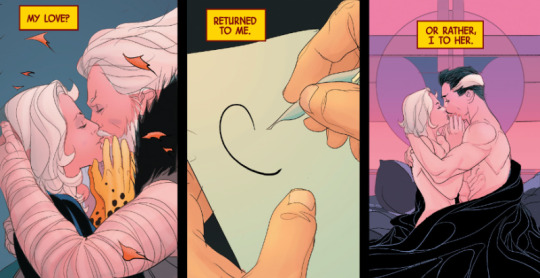
Now, back to the subtleties. They speak of a lovely couple teasing one another.
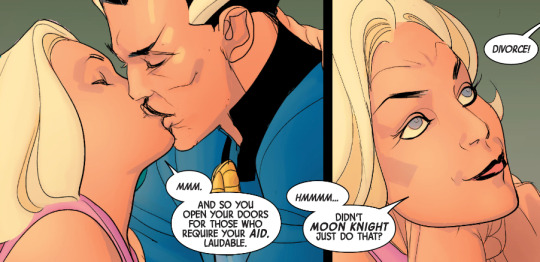
(Clea and Marc’s friendship is unbreakable now btw)
They speak of Stephen’s compassion towards his friends.
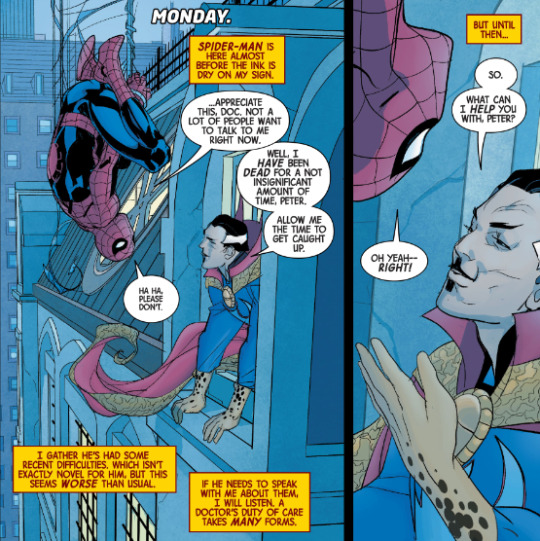
They speak of domestic life.

And fluffiness.
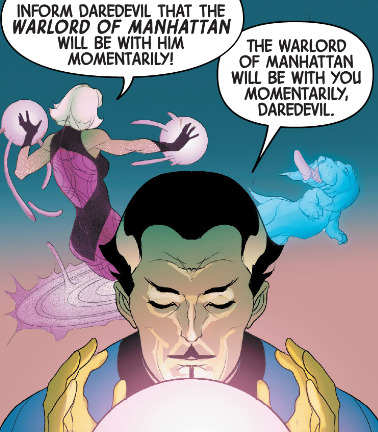
And peace of mind.
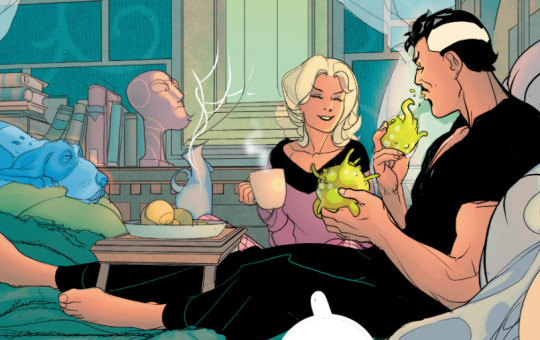
But they also speak of important matters like the crisis we have to face in order to fight for human rights and equality.
(if this metaphor is not clear, this IS a criticism towards the way the world has been treating war refugees, especially those of color)

In addition, those subtleties speak of injustice.

As well as conflict.
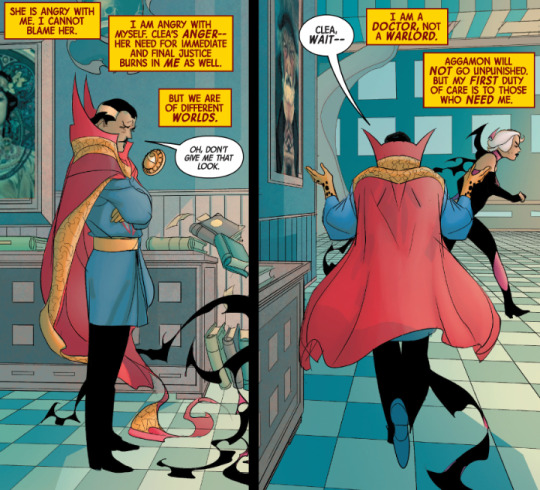
In short, this is the essence of Doctor Strange. If you want to learn who Stephen is, this is the perfect issue to illustrate it all. His kindness, compassion, duty, his conflicted heart, love and life, patience, altruism, stubbornness, weaknesses, flaws, maturity. He’s just a human with incredible mystic abilities and a powerful heart.
It’s not a dramatic story, it’s just... light-hearted in its own way. There’s conflict but the focus is a man who is finally learning happiness again. It’s an accurate portrayal of life, in which nothing is perfect but there’s beauty and joy. A well-deserved happiness after so much suffering and loneliness.
Plot-wise, I’m pretty sure Clea didn’t murder Aggamon. It’s probably just a device to create conflict in their marriage, which was expected by the interviews and solicitations. My heart is at peace because I know Jed wouldn’t reunite Stephen and Clea just to split them afterwards.
There’s also Wong’s new role as an agent of W.A.N.D., and he does have his own unique style to reach out to others -- through peace and compassion as well. I confess I’m in love with Wong in this uniform and I’m just so excited to see more of him and Pandora. He’s finally his own character, having his own life and personality. And I couldn’t be more grateful.
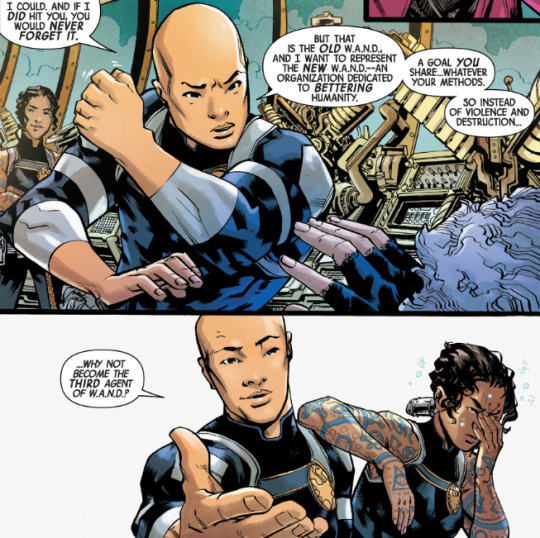
Looking forward to Nightmare and the mystery that surrounds Aggamon’s death. If DODS taught me anything, the culprit is closer than we suspect.
I’m also expecting some healing in the future issues. I know there was a tension between Stephen and Victor (a deserved one after DODS, if I may add) and an apology it’s out of question for a character like the king of Latveria, but a team-up would be nice to go past that. Also, Jed has been cooking Marc’s apologies for a while now (in both his MK’s run and DODS, as well as teased in the sneak peek). You know me, I’m always down to emotional bonding cause I’m hopeless 💜
Verdict: amazing issue! 10/10!
#doctor strange#stephen strange#clea strange#wong#pandora peters#bats the ghost dog#aggamon#peter parker#spider-man#jed mackay#pasqual ferry#matt hollingsworth#vc's cory petit#andy macdonald#ian herring#marvel comics#wednesday tomes#review
95 notes
·
View notes
Text

Would you like another reason to want to throat slam this "fiery-haired fool" (thanks for the nickname, Aylin)?
Alright *cracks knuckles*

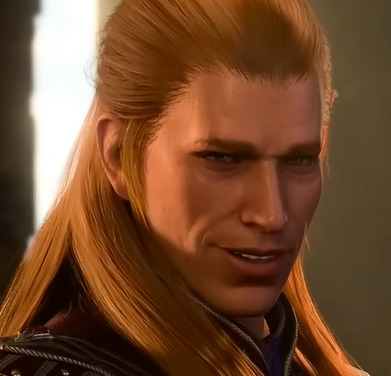
I think he's a bigot who sees a lot of races, except humans, (not all) elves, and half-elves as lesser beings. Just look at how he treats Miklaur and Rolan.
Tieflings: Hellspawn. Definitely inferior. He doesn't believe they're all inherently evil, no, (btw he absolutely thinks he's "progressive" for that) but they're such freakish creatures with their horns, the ridges on their skin, their fangs, and tails. Also, most of them are poor wretches/criminals (thanks to this bigoted society, which shuns Tieflings and often forces them into criminal paths..... but nvm.....).
Elves in general (except Drow and Wood-Elves): Peers and equals, respects them, but he envies them for their longevity and affinity for magic.
Halflings: I think it's very telling how he treats Miklaur. :/ I can't imagine him using someone HIS OWN SIZE as target practice.
Dwarves: He doesn't necessarily view them as lesser beings, but they're not his preferred company. Brutish and uncouth.
Dragonborn, Bugbears, Tabaxi, everyone who hasn't a humanoid face: Beasts (although, there might be exceptions when said beast is particularly scholarly or powerful).
Drow: Scheming, lying, murderous, backstabbing cave-dwellers. Dysfunctional society. Stay away.
Wood-Elves: Tree-huggers. Probably dirty. This notion also extends to Druids, by the way. (I'M SO SORRY HALSIN ;A;)
Githyanki: He doesn't really have an opinion on them as he hasn't met one yet. He knows they are fierce warriors and highly intelligent, and he can respect that. (I think he'd get along with Lae'zel ??)
Vampires, Lycans: Beasts.
Undead of any kind: Go back to your crypt, unless you're a very special Lich sdajfdsjf
Side note: I believe that he accepted Rolan as his apprentice because
a) he survived Elturel, which is quite impressive and caught his interest;
b) he can do some virtue signaling (LOOK AT ME, I, IN MY ENDLESS BENEVOLENCE, HAVE ACCEPTED A TIEFLING AS MY APPRENTICE, I'M SO PROGRESSIVE where is my badge of honor ????);
c) he knows that Rolan, like every refugee, must be desperate and will cling to this apprenticeship like a lifeline. And he does, which gives Lorroakan pretty much free rein to abuse his power over him (I think Rolan is the only apprentice he physically abused because of that reason, and I'll write a headcanon about that eventually).
#˗ˏˋ 💎 ∗ ╰ HEADCANONS ;#/ *sipping my coffee*#idk man he's just an ass#and I love and hate him#you can fix him#maybe#Lorroakan#bg3 headcanons
11 notes
·
View notes
Text
This week, UNRWA in Gaza (and maybe elsewhere) demanded that employees sign a Code of Conduct. It was several ages long. One section said:
UNRWA views gender equality in accordance with the views of the United Nations and as a result describes gender equality as including lesbian, gay, bisexual and transgender colleagues (UNRWA employees) and beneficiaries (service recipients - the refugee population).
It simply says that UNRWA employees must treat all people equally and with respect, in accordance to UN policies.
The reaction in Gaza was, predictably, fierce. And every single organization that commented argued that UNRWA should discriminate against gays.
The Joint Committee for Refugees in the Gaza Strip issued a statement saying, “This code violates the moral system of our Palestinian people.... blatantly violates the feelings of refugees and employees, calls for vice, and disdains all the customs, traditions, struggle, and history of our Palestinian people, and is in violation of to the laws of the host country....So-called gay rights are completely rejected and have no place in our Palestinian society, and the claim that they are among human rights are false claims."
The Joint Committee of the Employees’ Unions in the West Bank and Gaza Strip at UNRWA denounced the code, saying, "We call on UNRWA management to respect our values, our common sense, and our Islamic morals, and not to spread such ideas." They told union members to return the booklet unsigned.
The head of the Hamas government media office, Salama Maarouf, said, "We clearly declare that this matter is unacceptable to us, and we see it as a clear violation by the agency's management of its internal regulations and its founding work protocol, which requires it to adhere to the values, customs, and laws of the communities to which it provides services."
The Democratic Assembly of UNRWA Workers "called on the UNRWA administration to retract the bulletins and immediately investigate who placed them in the bulletins, and to apologize to the great Palestinian people for this incident, which is considered a dagger in the side of the Palestinian refugee." It also said that the Code "calls for immorality."
The Association of Palestine Scholars said that UNRWA was "glorifying obscenity and vice, and targeting the moral and humanitarian values of Palestinian society.”
You know, the moral and humanitarian values that celebrates murdering Jews.
30 notes
·
View notes